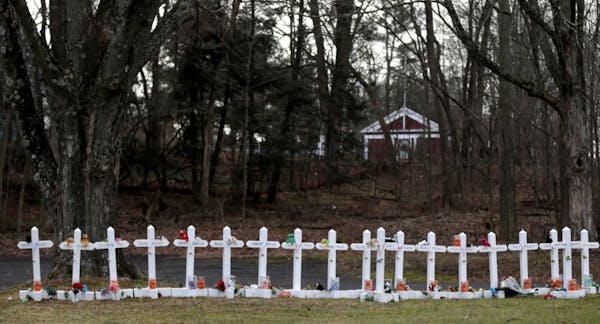The bloodiest video games are back in the spotlight after the National Rifle Association's chief lobbyist on Friday stoked a long-smoldering debate about whether violent games are harmful to society.
Wayne LaPierre, chief executive officer of the NRA, partially faulted video games for the Dec. 14 rampage at Sandy Hook Elementary, saying the games are a part of a "callous, corrupt and corrupting shadow industry that sells, and sows, violence against its own people."
Also Friday, the Associated Press reported that children in Newtown, Conn., the scene of the mass carnage that sparked the nationwide debate over gun violence, pledged to throw away video games containing violent scenes in a movement they called "Played Out: Choose Not to Play."
Gamers say they're being cast as scapegoats and note that millions of people play video games daily without incident. But the discussion has flared, with two U.S. senators calling for further study of the games and White House adviser David Axelrod tweeting this past week: "In NFL post-game: an ad for shoot 'em up video game. All for curbing weapons of war. But shouldn't we also quit marketing murder as a game?"
Authorities have not said that Connecticut shooter Adam Lanza, who killed his mother and then entered the school and killed 20 children and six adults, played video games. Still, the multi-billion-dollar gaming industry has been on guard since the rampage, issuing occasional cautious statements.
Hal Halpin, president of the Entertainment Consumers Association, which represents game enthusiasts, said in a statement that it was too early to make assumptions on the role of violent media in the killings, noting the "lack of evidence to support a causal link."
David Walsh, who spearheaded the now-defunct Minneapolis-based National Institute on Media and the Family, which championed game-rating efforts, said he's not optimistic that the violent games will fall out of favor.
"A lot of the things we asked the industry to do, they have done, and yet the games continue to be violent, and no one is going to be able to legislate the content," he said.
The current debate might be less about the issues of violence in media and more about redirection of blame, Walsh added.
"A tragedy like Connecticut has multiple causes," he said. "The sad thing is that everybody who does have some responsibility wants to point the finger in the other direction."
Focus stays on games
Minneapolis resident Mike Brown is an enthusiast of Halo, which pits human shooters against alien invaders. He finds it particularly unfair to single out video games when there are other violent elements of pop culture.
"If you're going to point the finger at video games, you need to point the same finger at television, media and movies," he said. "Video games are an easy scapegoat."
In addition to his broadside about video games, LaPierre cited horror films as negative influences on society, as well as other kinds of media.
After the Connecticut shootings, several TV networks pulled programs with sensitive plot lines, or aired violent shows such as "Dexter" and "Homeland" with disclaimers in advance. Hollywood premiere events for violent movies "Jack Reacher" and "Django Unchained" were cancelled in the wake of the shooting.
Aggression study
But video games have garnered extra scrutiny in the wake of mass shootings since Columbine, where the two shooters were known to play the shooter game "Doom."
Those who oppose the violent games often cite a study that found kids were more aggressive after playing them and worry about the games desensitizing players to violence. Other researchers have questioned the study's results.
Sen. Joe Lieberman, I-Conn., voiced concerns in the days after the shooting about violent media provoking more violence in society. Sen. Jay Rockefeller, D-W. Va., introduced legislation last week calling for a study of the effects of violent video games on children and an examination of game ratings.
Violent games sell
Past efforts to regulate the enormous video-gaming industry or reduce violence in the games have yielded mixed results and have had little effect on the popularity of the most violent games.
The latest installment of the "Call of Duty" franchise, in which players are soldiers, raked in more than $1 billion in sales in just 15 days this fall. Other controversial games include "Grand Theft Auto" and "Mortal Kombat."
Consumers spent $24.75 billion on all types of games, hardware and accessories in 2011, according to the Entertainment Software Association.
The U.S. Supreme Court, weighing in on a California law that prohibited the sale of violent video games to minors, ruled in 2011 that the content of games is protected under the First Amendment. The parental rating system that Walsh advocated, however, did come to fruition after years of advocacy by those appalled by the graphic, brutal nature of some games -- especially those that position the person playing as a shooter.
The so-called "first-person shooter" games remain among the most popular.
Katie Humphrey • 612-673-4758
